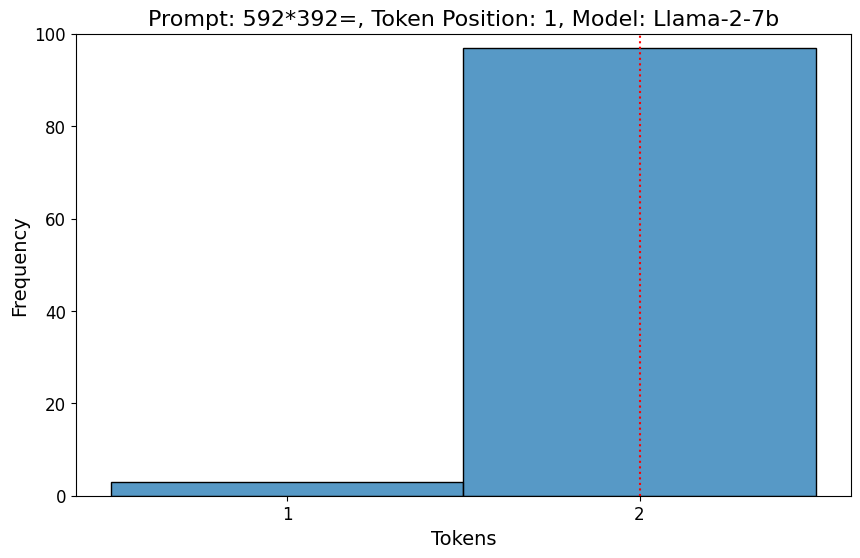Language Models Do Hard Arithmetic Tasks Easily and Hardly Do Easy Arithmetic Tasks

0

Sign in to get full access
Overview
- This paper investigates the surprising capabilities and limitations of large language models (LLMs) when it comes to performing arithmetic tasks.
- The researchers found that LLMs can easily solve complex multi-step arithmetic problems, but struggle with simple single-step calculations.
- This counterintuitive behavior challenges the common assumption that LLMs' performance on mathematical tasks scales linearly with problem difficulty.
Plain English Explanation
The paper examines how well large language models (LLMs) - powerful AI systems trained on vast amounts of text data - can handle arithmetic problems. Surprisingly, the researchers discovered that LLMs excel at solving complex, multi-step math problems, but struggle with simple, single-step calculations.
This is an unexpected finding, as one might assume that LLMs would perform better on easier math tasks and have more difficulty with harder ones. However, the paper shows that the relationship between LLM performance and problem difficulty is not straightforward.
For example, an LLM might be able to effortlessly solve a complex algebra problem involving multiple steps, but then fail to correctly add two small numbers together. This counterintuitive behavior challenges the common belief that LLMs' mathematical abilities scale linearly with the difficulty of the problems.
The researchers' discoveries shed new light on the inner workings of these powerful AI models and raise important questions about the nature of their reasoning and problem-solving capabilities. Understanding the strengths and limitations of LLMs in mathematics is a crucial step towards developing more capable and reliable AI systems.
Technical Explanation
The paper presents a series of experiments that evaluate the arithmetic capabilities of large language models (LLMs). The researchers tested LLMs on a wide range of math problems, from simple single-step calculations to complex multi-step algebraic and geometric problems.
Contrary to expectations, the results showed that LLMs excel at solving difficult, multi-step math problems, but struggle with basic, single-step arithmetic tasks. For example, LLMs were able to solve complex algebra problems involving multiple steps, but often failed to correctly add or subtract small numbers.
To further investigate this counterintuitive finding, the researchers conducted additional experiments using synthetic datasets and probing techniques. The results consistently demonstrated this unusual pattern of LLM performance, where the models perform much better on harder math problems compared to simpler ones.
The paper provides several possible explanations for this behavior, including the possibility that LLMs may be relying on different problem-solving strategies or reasoning mechanisms for easy versus difficult math tasks. The researchers also explore the implications of these findings for the development of more capable and reliable AI systems for mathematical reasoning.
Critical Analysis
The paper presents a carefully designed and thorough investigation of LLMs' arithmetic capabilities, and the findings are indeed quite surprising and thought-provoking. The researchers acknowledge several limitations and caveats in their work, such as the potential impact of dataset biases and the need for further research to fully understand the underlying mechanisms driving the observed patterns.
One area that could benefit from further exploration is the role of different problem-solving strategies or reasoning mechanisms employed by LLMs for easy versus difficult math tasks. The paper suggests this as a potential explanation, but more detailed analysis or experimentation would be helpful to validate this hypothesis.
Additionally, the researchers could have delved deeper into the potential practical implications of their findings. While the paper discusses the broader implications for developing more capable and reliable AI systems, it would be valuable to explore specific use cases or applications where this unusual LLM behavior might have significant real-world consequences.
Overall, the paper makes a valuable contribution to our understanding of the mathematical capabilities and limitations of large language models. The counterintuitive findings challenge common assumptions and highlight the need for continued research and careful evaluation of these powerful AI systems.
Conclusion
This paper presents a thought-provoking investigation into the surprising arithmetic capabilities of large language models (LLMs). The researchers found that LLMs excel at solving complex, multi-step math problems, but struggle with basic, single-step calculations - a finding that runs counter to the common assumption that LLM performance scales linearly with problem difficulty.
These discoveries shed new light on the inner workings of LLMs and raise important questions about the nature of their reasoning and problem-solving strategies. Understanding the strengths and limitations of LLMs in mathematics is a crucial step towards developing more capable and reliable AI systems that can be safely and effectively deployed in real-world applications.
While the paper acknowledges several limitations and areas for further research, its findings challenge common assumptions and offer valuable insights that can inform the ongoing development and deployment of large language models in various domains, including but not limited to mathematics and scientific reasoning.
This summary was produced with help from an AI and may contain inaccuracies - check out the links to read the original source documents!